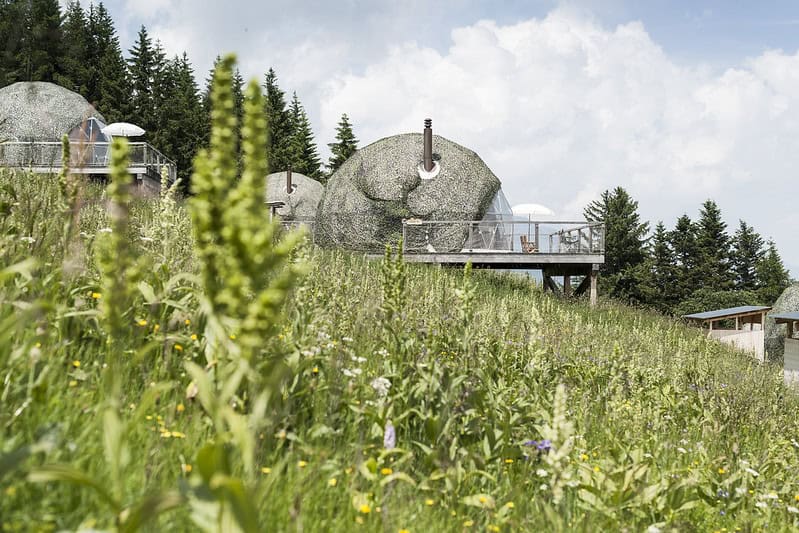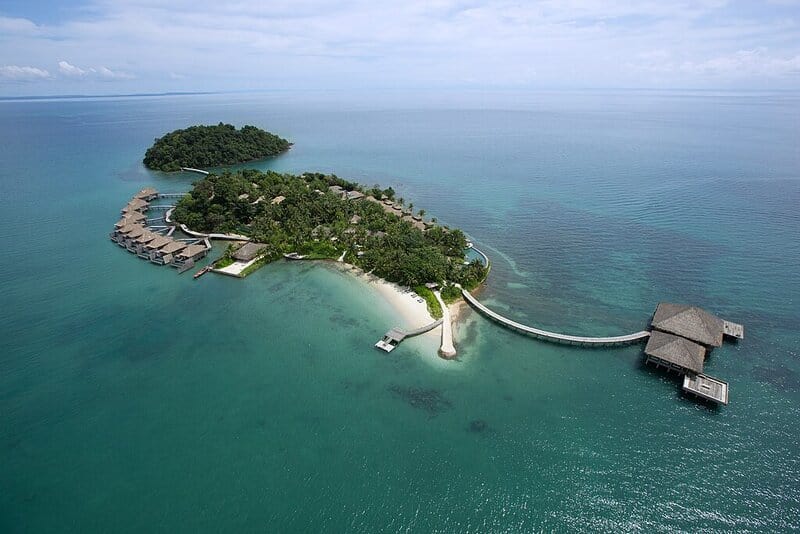
Travel can be transformative, offering unforgettable experiences and deeper connections to the world around us. Yet, it also carries significant environmental implications, contributing substantially to climate change through carbon emissions, waste generation, and resource consumption.
As awareness of our ecological footprint grows, travelers are increasingly prioritizing accommodations that align with their values—seeking hotels genuinely committed to sustainability and eco-friendly practices. In response, hospitality businesses worldwide are stepping up, embracing innovative approaches to reduce their environmental impact and promote responsible tourism. This article highlights hotels that are not just paying lip service but demonstrating genuine care for our planet.
1. 1 Hotel Brooklyn Bridge, New York, USA

Nestled along the vibrant Brooklyn waterfront, 1 Hotel Brooklyn Bridge sets a new standard in urban sustainability. Unlike traditional city hotels, this property emphasizes ecological responsibility through thoughtful design and innovative practices. Interiors feature reclaimed wood and local materials, reducing waste and minimizing the carbon footprint associated with transportation.
The hotel also boasts a sophisticated rainwater harvesting system, significantly decreasing freshwater consumption by repurposing collected rainwater for irrigation and cooling purposes. Its expansive green roofs not only insulate the building naturally but also provide habitats for local wildlife, creating a lush urban oasis amidst New York’s bustling skyline.
2. Whitepod Eco-Luxury Hotel, Switzerland

High in the picturesque Swiss Alps, Whitepod Eco-Luxury Hotel offers guests a truly unique and sustainable alpine experience. Departing from traditional chalets, Whitepod accommodates visitors in innovative geodesic domes—structures specifically designed to optimize energy efficiency by reducing heat loss and maximizing natural light.
Each dome is strategically positioned to blend seamlessly with the surrounding landscape, significantly minimizing environmental disruption. Renewable energy and water-saving technologies further lower the hotel’s ecological impact. Unlike conventional alpine hotels, Whitepod prioritizes sustainability without compromising luxury, demonstrating that responsible tourism and high-end comfort can harmoniously coexist in a pristine mountain setting.
3. Bardessono Hotel & Spa, California, USA

Situated in California’s lush Napa Valley, Bardessono Hotel & Spa exemplifies luxurious sustainability, holding the prestigious LEED Platinum certification—one of the highest environmental distinctions achievable. Unlike many luxury spa hotels, Bardessono harnesses extensive solar panel installations to power its facilities, significantly reducing dependence on non-renewable energy.
Its meticulous organic gardens supply fresh produce directly to the hotel’s acclaimed restaurant, decreasing food miles and promoting farm-to-table dining. Additionally, the property incorporates recycled building materials and advanced water conservation techniques, highlighting its genuine commitment to ecological responsibility while providing guests with an indulgent and rejuvenating spa experience.
4. Inkaterra Machu Picchu Pueblo Hotel, Peru

Hidden within Peru’s lush Andean cloud forests, Inkaterra Machu Picchu Pueblo Hotel stands out for its deep commitment to environmental conservation and biodiversity. Distinguished from many eco-lodges worldwide, Inkaterra actively leads conservation programs aimed at protecting native wildlife and promoting ecological research.
Guests can explore extensive trails that showcase hundreds of orchid species and thriving bird habitats, reflecting the hotel’s dedication to preserving local biodiversity. Additionally, Inkaterra maintains carbon-neutral operations by offsetting emissions through reforestation initiatives. By seamlessly integrating sustainability with cultural immersion, Inkaterra Machu Picchu Pueblo Hotel offers travelers an authentic and environmentally responsible gateway to Peru’s natural wonders.
5. Hotel Verde, Cape Town, South Africa

Just moments away from Cape Town International Airport, Hotel Verde redefines what sustainability means in an urban setting. Unlike typical city accommodations, Hotel Verde boldly integrates renewable energy solutions, featuring on-site wind turbines and solar panels that significantly reduce reliance on conventional power sources.
The hotel also excels in waste management, employing comprehensive recycling programs and composting practices to minimize landfill contributions. Advanced greywater recycling systems conserve substantial amounts of water, crucial in South Africa’s drought-prone climate. Through these pioneering initiatives, Hotel Verde sets a remarkable precedent for urban hotels worldwide, proving sustainability can be both practical and impactful.
6. Soneva Fushi, Maldives

Located amidst the pristine turquoise waters of the Maldives, Soneva Fushi exemplifies island sustainability at its finest. Distinct from typical luxury resorts, Soneva Fushi actively pursues an ambitious zero-waste policy—transforming waste into valuable resources through sophisticated recycling and composting measures.
The resort’s marine conservation programs include coral restoration projects and sustainable fishing practices, directly contributing to the preservation of the delicate marine ecosystems surrounding the island. Additionally, renewable energy installations, such as solar power systems, significantly reduce reliance on imported fossil fuels. Soneva Fushi demonstrates that island resorts can provide unparalleled luxury while genuinely protecting their breathtaking natural environments.
7. Proximity Hotel, North Carolina, USA

Located in Greensboro, North Carolina, Proximity Hotel sets itself apart from conventional regional hotels through its pioneering approach to sustainability. As the first hotel in the U.S. to achieve the distinguished LEED Platinum certification, Proximity emphasizes innovative energy practices, including geothermal heating and cooling systems that significantly reduce energy consumption.
Enhanced insulation, abundant natural lighting, and solar thermal panels further elevate energy efficiency across the property. Unlike standard hotels in the region, Proximity actively monitors and manages its environmental impact, demonstrating that sustainability can seamlessly blend with refined comfort and hospitality in a modern urban setting.
8. Tierra Patagonia Hotel & Spa, Chile

Overlooking the breathtaking Torres del Paine National Park, Tierra Patagonia Hotel & Spa embodies sustainable architecture deeply rooted in its rugged surroundings. Unlike typical Patagonian accommodations, the hotel features a sleek, low-profile design that seamlessly integrates with the landscape, minimizing visual and environmental disturbance.
Its structure utilizes responsibly sourced local materials, such as native lenga wood, reducing transportation emissions and supporting regional economies. Additionally, expansive windows cleverly positioned throughout the hotel maximize natural lighting and passive solar heating, significantly reducing energy consumption. Tierra Patagonia showcases how thoughtful architectural choices can harmonize luxury hospitality with profound respect for local ecology.
9. Svart Hotel, Norway

Perched dramatically above Norway’s Arctic Circle, Svart Hotel represents a groundbreaking step forward in sustainable hospitality. Unlike traditional Nordic accommodations, Svart Hotel aims to become the world’s first energy-positive hotel—generating more energy than it consumes through extensive solar power utilization and innovative architectural design.
Embracing circular economy principles, the hotel prioritizes waste reduction, resource reuse, and closed-loop systems throughout its operations. Its futuristic, circular structure not only enhances energy efficiency but also minimizes environmental disruption, elegantly blending into the pristine Arctic landscape. Svart Hotel vividly demonstrates that ambitious sustainability and cutting-edge luxury can coexist harmoniously in even the most challenging environments.
10. Song Saa Private Island, Cambodia

Set amidst Cambodia’s untouched Koh Rong archipelago, Song Saa Private Island blends luxurious island living with a sincere commitment to conservation. Unlike conventional luxury resorts, Song Saa has established dedicated marine reserves, actively protecting coral reefs and marine biodiversity from overfishing and environmental harm.
Additionally, the resort prioritizes meaningful community engagement, investing in local education, healthcare initiatives, and sustainable livelihood programs, ensuring tourism benefits extend to neighboring communities. Through rigorous conservation efforts such as mangrove restoration and wildlife monitoring, Song Saa exemplifies how island resorts can offer exceptional guest experiences while actively preserving ecosystems and empowering local cultures.
11. The Brando, French Polynesia

Nestled on the pristine atoll of Tetiaroa, The Brando redefines luxury by placing sustainability at its core. Unlike conventional luxury resorts, this secluded paradise utilizes innovative renewable energy solutions, including solar power systems and biofuel generators derived from coconut oil, significantly reducing fossil fuel dependence.
Its pioneering seawater air conditioning system harnesses cold ocean water to cool the resort, dramatically cutting energy consumption. The Brando seamlessly integrates ecological responsibility with opulent comfort, offering organic dining options and promoting conservation research programs. This thoughtful approach demonstrates that true luxury can be achieved responsibly, protecting the fragile beauty of Polynesia’s ecosystems.
12. Six Senses Qing Cheng Mountain, China

Situated near the serene foothills of Qing Cheng Mountain, Six Senses Qing Cheng redefines luxury hospitality in China with its comprehensive sustainability initiatives. Unlike typical Chinese luxury hotels, this property emphasizes eco-friendly architecture, utilizing locally sourced materials and traditional design techniques to harmonize with the natural landscape.
Its innovative water purification systems ensure minimal environmental impact, recycling and filtering water for reuse throughout the resort. Additionally, an extensive organic farm provides fresh produce directly to the hotel’s restaurants, significantly reducing food miles and promoting sustainable agriculture. Six Senses Qing Cheng illustrates how luxury accommodations can embrace authentic sustainability while celebrating local culture.
13. Bambu Indah, Bali, Indonesia

Tucked away amidst lush Balinese landscapes, Bambu Indah offers travelers a refreshingly sustainable alternative to common island resorts. Its striking eco-conscious architecture prominently features bamboo—a renewable, fast-growing resource—beautifully crafted into elegant structures that blend naturally with the surroundings.
Extensive organic permaculture gardens supply fresh produce, herbs, and spices directly to the hotel’s restaurant, drastically reducing food transportation emissions and promoting local biodiversity. Additionally, comprehensive recycling and waste management initiatives further minimize ecological impact. By thoughtfully combining traditional Balinese design with modern sustainability practices, Bambu Indah demonstrates that eco-luxury retreats can authentically celebrate nature while preserving Bali’s rich environment.
14. Garonga Safari Camp, South Africa

Nestled within South Africa’s pristine Makalali Conservancy, Garonga Safari Camp redefines the traditional safari experience through its unwavering commitment to sustainability. Unlike standard safari lodges, Garonga harnesses solar power extensively, significantly reducing dependence on fossil fuels and minimizing carbon emissions.
Its comprehensive waste management system incorporates recycling, composting, and responsible disposal practices, further shrinking the camp’s ecological footprint. Additionally, Garonga actively supports wildlife conservation initiatives, collaborating with local organizations to protect endangered species and preserve biodiversity within the reserve. By seamlessly blending authentic bush luxury with genuine environmental stewardship, Garonga Safari Camp sets a remarkable standard for sustainable wildlife tourism.
15. Fogo Island Inn, Canada

Perched dramatically on Newfoundland’s rugged coastline, Fogo Island Inn exemplifies community-centered sustainability and authentic Canadian hospitality. Unlike typical Canadian hotels, this property deeply integrates local craftsmanship, with furniture, textiles, and art pieces handcrafted by regional artisans, directly supporting the island’s economy and cultural heritage.
The inn actively participates in ocean conservation initiatives, advocating for responsible fishing practices and marine ecosystem protection. Moreover, profits are reinvested into community programs, ensuring tourism directly benefits Fogo Island residents. By thoughtfully intertwining luxury hospitality, environmental stewardship, and cultural preservation, Fogo Island Inn showcases a genuinely responsible approach to sustainable tourism in Canada’s remote, breathtaking landscapes.
Conclusion

As travelers, our choices carry significant power—selecting sustainable accommodations directly encourages the hospitality industry to prioritize environmental responsibility. Hotels around the globe, from urban retreats to remote island resorts, are demonstrating that luxury and sustainability can coexist beautifully.
By supporting properties committed to renewable energy, waste reduction, biodiversity conservation, and community engagement, we help protect the planet for future generations.
Ultimately, our travel decisions shape industry standards and practices. Let us choose wisely, favoring hotels that genuinely care for the environment, and together, make sustainable tourism the new normal.